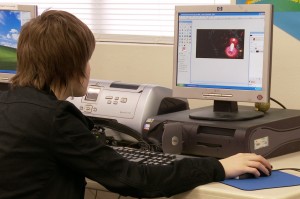By Kate Scriven
Dr. Murray Smith has been at it for a long time. With over 25 years under his belt as a chiropractor at Eastside Chiropractic, he has seen a lot of changes come and go throughout the years. However, in the last three to four years he has seen a dramatic, and troubling, increase in what he calls “techno-health” issues.
It’s no coincidence that this up-tick in technology related health issues follows the rise in personal, handheld computing devices. It’s almost unheard of for someone to be without a smart phone or tablet. In fact, most households own multiple devices include tablets, e-readers, smartphones, and hand-held video gaming devices, many in the hands of children.
Early in Dr. Smith’s practice he saw “60% of issues related to low back and 40% of everything else. Now it’s 40% low back and 60% everything else.” That “everything else” includes technology related strain taking a toll on our bodies and health in ways we’ve never experienced before. A quick Google search returns conditions with names such as:
- Cell phone elbow
- Nintendonitis
- Joystick Wrist
- Texting Thumb
- Wii Shoulder, Neck or Knee
- Texting Tendonitis
 All of these conditions can be classified as “RSI’s” or Repetitive Strain Injuries and are characterized by doing one thing, the same way, for too long. This is often the head down and forward position used for texting, gaming or browsing on your smartphone or tablet known as “techno-neck.” The average human head weighs 10 pounds in a neutral position, ears over your shoulders. With every inch you tilt your head forward, the pressure on your spine doubles. This means that when looking at a smartphone or tablet in your lap or hands, your head feel like 20 – 30 pounds. Compound that with the stationary position of your bent elbows and your isolated, rapidly moving thumb joints and you have a recipe for trouble.
All of these conditions can be classified as “RSI’s” or Repetitive Strain Injuries and are characterized by doing one thing, the same way, for too long. This is often the head down and forward position used for texting, gaming or browsing on your smartphone or tablet known as “techno-neck.” The average human head weighs 10 pounds in a neutral position, ears over your shoulders. With every inch you tilt your head forward, the pressure on your spine doubles. This means that when looking at a smartphone or tablet in your lap or hands, your head feel like 20 – 30 pounds. Compound that with the stationary position of your bent elbows and your isolated, rapidly moving thumb joints and you have a recipe for trouble.
While handheld devices are to blame for the recent increase in techno-health issues, they can also stem from overuse of a computer and mouse, repeated motions from video games, or simply too much time at the keyboard. The result? Inflammation in body areas seeing repetitive movements or in areas with prolonged engagement of muscle in one position.
Solution? There are many. Dr. Smith’s number one fix is to simply engage less with technology and move your body more. This simply fix is free and extremely effective. However, some “techno-health” issues can’t be avoided, particularly if associated with your job. To minimize the impact, here are solutions to integrate into your routine:
- Take Breaks – Seems simple, right? But taking breaks, walking around to loosen muscles, during repetitive activities allows your body to use different muscles and give others a break. When problem areas are particularly inflamed, use ice during breaks to ease discomfort. Even mini-breaks, removing hands from the keyboard, doing neck or shoulder rolls, helps minimize RSIs.
- Stretch – Don’t underestimate the importance of stretching for overall health. Flexibility is key to keeping joints and muscles performing their best, and you feeling your best.
- Braces or Supports – There are many support tools on the market for wrists, knees and hands that can alleviate pain by supporting the joints, tendons and muscles.
- Ergonomic Evaluation – Particularly if your issues lie in repetitive actions due to work at a desk, seek an evaluation of your workstation. Simple things like desk height, chair height and support, and mouse and keyboard structure can dramatically effect comfort.
- Condition your Body – Staying in good physical condition is just plain smart. But it can also help minimize the effect of RSIs. When your muscles are already strong, bones and structures in the body are supported, reducing the impact of repetitive motions.
 “Why not just stop?” asks Dr. Smith. Why not reduce or eliminate the behaviors that are causing issues, particularly the entertainment related activities with hand-held devices? Simply looking up, seeing the sunny day and the people around you, can positively impact the muscles of your neck, shoulders and your spine. And who knows? It may impact your mood as well as you see a friend, smile at a stranger or witness a beautiful flower in bloom.
“Why not just stop?” asks Dr. Smith. Why not reduce or eliminate the behaviors that are causing issues, particularly the entertainment related activities with hand-held devices? Simply looking up, seeing the sunny day and the people around you, can positively impact the muscles of your neck, shoulders and your spine. And who knows? It may impact your mood as well as you see a friend, smile at a stranger or witness a beautiful flower in bloom.
Technology is here to stay. Dr. Smith knows that as well as the rest of us. But by awareness of the impact our handheld devices and other technology are having on our posture, and ultimately our health, we can avoid the negative physical impacts while still enjoying the convenience and entertainment they provide.
So, do you have techno-neck? Nintendonitis? If you want to know if your achy shoulders, headache and neck pain could be due to technology, visit Dr. Smith. “If chiropractic can be part of your recovery, I’ll tell you. And if not, I’ll tell you that too. I’ve been at this so long I’ve developed a great network of other docs, physical therapists, massage therapists and others I can refer you to if that’s what you need.”
1526 Bishop Rd SW in Tumwater
360-459-9000
















































